
Medical thought leaders are worried that many of us could be putting their health at risk by not following instructions from

Hamzah Baig of GSK
doctors, nurse, and pharmacists when taking their medications. That’s after new research released this week that shows a quarter of those spoken with have not followed instructions about a course of treatment prescribed by a doctor, while only a 20% always complete a course of medication.
The study also shows that many people don’t believe there is anything wrong with not following instructions to the letter with a quarter believing that a course of treatment does not need to be followed rigidly to get better, and 45% saying they trust their body telling them they feel better more than a prescription course of a treatment.
However, experts say while symptoms can often abate, that doesn’t always mean the patient has sufficiently recovered. There is particular concern over people not finishing courses of antibiotics which can make bugs resistant, presenting danger to not only the patient but also others in the community.
Of further concern is the one in ten surveyed by Pharmacy Voice who admit to taking more than the recommended dosage, while a quarter don’t always use measures when taking liquid medication. One in seven say they have used out of date medicines and one in 20 even use medication which was prescribed to family or friends.
Other findings saw more than 40% admit they keep unused prescribed medicines just in case they need them again, while less than 40% return unused medicine to the pharmacy which is recommended, with a quarter throwing unused medication in the bin or in the toilet.
PatientTalk.Org’s Giles Draper was very kindly given the opportunity to interview Dr Hamzah Baig who is Medical Director at GSK and Raj Patel, a community pharmacist and member of Pharmacy Voice.
GILES: Joining Patient Talk now are Dr Hamzah Baig and Raj Patel. Dr Baig, what are the main barriers to medication compliance from the point of view of both patient and healthcare professional.
DR BAIG As this new research today has shown, one of the main barriers to compliance is the fact that people deliberately don’t follow the instructions about the course of the treatment that they take. For example, only a fifth complete a course of a medication and one in ten have taken more than the recommended dosage and one in seven use out of date medicine, so people aren’t really following the instructions given with their medicines.
MR PATEL Also, patients just don’t remember when and how to take their medicines, they may lead a hectic lifestyle and they just basically forget . That will affect compliance and just stop them from taking their medicines as they need to .Some patients go on holiday and think I’ll just stop taking this antibiotic while I’m on holiday. Or they go out for a drink one evening and they’re in the middle of an antibiotic course and they’ll think, I’ll just stop taking it tonight, have a few drinks and carry on the course the next day .
GILES: Dr Baig, have these patterns of non-compliance changed in anyway?
DR BAIG They haven’t really changed over many years. I think it’s something that both Doctors and pharmacist have been trying to look into to try and improve compliance. Obviously these days we have more digital tools at our means, so you can get apps that help with when you can take your medicine all the way through to some tradition ways of using dosette boxes which are little plastic boxes which have the days of the week and you can take all of your medicines and empty them out and get your full weeks medicine divided up in the right time and days for you. Although these are tips and tricks. I think that quite a lot of education needs to happen to allow people to take the medicines and get the full potential from the medicines.
GILES: Raj, what can be done to improve compliance, any other examples you can give?
MR PATEL I think that another way we can improve compliance amongst patients is to make sure they understand why they are taking their medicines. Here’s an opportunity to use your local community pharmacist to sit down with them talk about the medicines and why they have been prescribed, possible side effects they may encounter and when they need to take those medicines. That will improve compliance because the patient is more knowledgeable.
GILES: Dr Baig, can you just tell us a bit about the risk of not taking prescribed medication and give us some examples?
DR BAIG Well I think that two of the most published examples of the risk of not taking prescribed medication include for example with short term conditions like an infection if you don’t take the full course of the antibiotics you’re at risk of perhaps getting that infection come back or it not being fully treated. With more long term conditions such as asthma for example , you can end up having some terrible affects such as asthma attacks in the future because you haven’t fully controlled your condition with the medicines that you’ve been given.
GILES: Raj would you like to comment on that:
MR PATEL Main risk of noncompliance are patients that are on medicines that if they suffer from heart disease, if they stop taking their cholesterol tablet or if they stop taking their blood pressure tablet they are increasing their risk of a stroke and the repercussions long term of having a stroke, you could end up in a wheelchair and not be able to walk etc. So we need to make sure that patients take the medicines when they need to take them.
GILES: Will the many new social media apps that have appeared help with compliance?
DR BAIG I think that it will help a certain population – perhaps some younger people, people who are a bit more technology aware but you’ve got to remember that the vast majority of treatments are taken by people who are later in life, who may have other problems such as difficulty with hearing, problems with their joints and things like that so I think it may go some of the way to helping people but there’s obviously a lot more we need to do for a lot more people out there.
GILES: Raj,can you tell us what Pharmacy Voice is, and how it can benefit patients?
MR PATEL Pharmacy Voice represents community pharmacy, employers and it represents 11,000 community pharmacies in England. We’re there just to represent community pharmacies and how it can help with patients. I would say that patients that utilise their pharmacies more, that spend time talking with them about any concerns they have about their medicines, talk to them about possible side effects and also when to take the medicines and if they are not sure if they should be taking it with or without food or if they should be taking it last thing at night. The pharmacist is in the best position to give you this advice, we’re health care professionals on the high street, we’re open long hours you don’t need to make an appointment and you’ll have a private consultations where you can actually talk to the pharmacists in confidence.
GILES: Dr Baig, what role can pharma play?
DR BAIG Well I think we already play a bit of a role by making sure that the leaflet that you get in every prescription pack of medicines gives a full picture of information to the patient about how to take the medicine , the importance of how to take the medicine and also a lot of information about the side effects you can get from taking the medicine but practically in the digital age we can make sure that information is available in places that people look for it, I’m thinking the internet and websites as well to support people in understanding how to take their medicines.
GILES: And what would you say are the major concerns regarding the overuse of medications?
MR PATEL Well one of the main concerns is about superbugs, we heard it on the new last week’s where patients are not taking the antibiotics or not completing the course and then you get superbugs. And also the other risk of not taking your medicine is that the doctor may think well hold on second I’ve prescribed your something and it’s not working so they will give you something stronger and before you know it you’ve been treated for something you may not need to be treated for.
DR BAIG Yes absolutely, I think as well we need to think about the fact that actually wasted medicines or not treating medicines can cost the NHS quite a lot of money, almost 300 million pounds is wasted in medicines not being taken appropriately and obviously it might lead to more people attending A and E with problems that are related from not taking the medication and that can put a burden on the NHS as well.
MR PATEL And also if your taking more then what’s recommended on the dosage you can get more side effects and also other complications so always try to stick with what’s on the label, what’s on the patient leaflet and stick within the recommended guidelines because the drug companies have tried and tested these products over five to ten years and when they come to the market place you need to stick to what’s on the tin.
Pharmacy Voice was formed by the three largest community pharmacy owner associations to create a stronger, unified voice for their independent and multiple members. The founding members of Pharmacy Voice are the Association of Independent Multiple Pharmacies (AIMp), the Company Chemists’ Association (CCA) and the National Pharmacy Association (NPA).
www.pharmacyvoice.com




